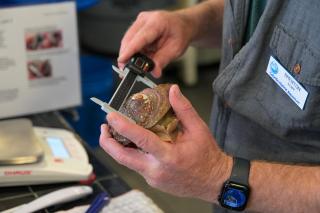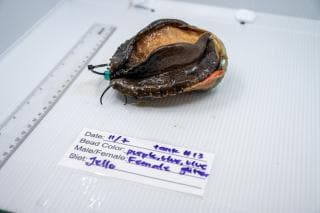Mission Statement
Cabrillo Marine Aquarium’s long-held mission is “to engage all visitors in education, recreation, and research to promote knowledge, appreciation, and conservation of the marine life of Southern California”. The Aquarium is fully accessible, free admission, and offers a wide range of education programs that are free or low-cost.
Accreditation
Cabrillo Marine Aquarium is accredited by the Association of Zoos and Aquariums (AZA). Accreditation is an intensive process that involves regular evaluation to ensure the Aquarium meets the highest standards of animal care and welfare, educational experiences, and supports important research and conservation programs. The Aquarium is a gold-level partner of AZA’s Saving Animals from Extinction (SAFE) Sharks and Rays program. Additionally, many staff at the Aquarium serve on AZA committees and work groups focused on advancing conservation and animal wellbeing.
Learn more about AZA and their accreditation program through their site: https://www.aza.org/
Animal Wellbeing
Cabrillo Marine Aquarium places the highest priority on the care of our animals. We have a long and proud history of assuring our animals are in excellent health. Animal welfare is a term that once largely meant assuring an animal's physical health. However, over the past decade, accredited zoos and aquariums' view on animal care has been greatly refined and expanded thanks to increased research in the field of welfare. Animal welfare is now partnered with the adjoining concept of animal wellbeing. Animal wellbeing considers all aspects of an animal's needs including mental and social aspects.
Learn more about what we do through our Ambassador Animal Policy, Training and Appendix.
Caring for our Animals
Our animals are fed high quality, locally-sourced food and receive first class veterinary care. Water quality is meticulously maintained in exhibits and daily observations are scheduled to provide staff with as much information as possible about the live collection. What moves the needle from welfare to wellness is the addition of a robust enrichment program and regular wellness evaluations. Enrichment is provided by changing elements of the animal's environment; varying food and/or feeding methods; change of water flow; introduction into new environments; having different textures introduced; physical changes to their environment by introduction of toys or novel objects; and changing the types of surfaces and materials they interact with. Providing enrichment for our fish results in reduced stress levels, improved growth rates, healthier looking fins, and longer life spans. Enrichment for our inquisitive octopus helps to keep her mentally stimulated. Our crustaceans are provided shells that they actively organize and move around. Invertebrates such as our sea stars and urchins are enriched by changing water flow and nutrient variances.
The Aquarium strives for our animals to have the opportunity to express their natural behaviors and this applies to all animals at our aquarium, big or small.


Continuous Monitoring
It is important to track all our animal’s responses to various enrichments to make sure they are having the desired effect.
Assessments of all animals in our collection happen on a regular basis and these assessments go far beyond monitoring enrichment response and these evaluations include consideration of social interactions and making sure the animal has choice and control options in their environment. Each category is rated as poor, adequate, or excellent. Of course, we aim for every category in the assessment to be noted as “excellent”. Even so much as an “adequate” assessment grade in our multi-point inspection is escalated to our Animal Welfare Committee. This committee is composed of experts from across the Aquarium with various expertise and each situation brought to the committee is given careful consideration, solutions are presented, and there is continual followup to monitor modifications made for that animal.
Visitor Wellbeing
Our mission is to engage all visitors in education, recreation, and research to promote knowledge, appreciation and conservation of the marine life of southern California. In order to provide this experience to our visitors, the Aquarium believes wholeheartedly that keeping animals at the Aquarium must be coupled with a profound sense of responsibility for our animals' care. Interactions with animals at aquariums can have positive health impacts on humans such as boosting moods, lowering blood pressure, and lowering stress levels.
At the Aquarium, we believe that it is our responsibility to give back to these creatures that bring us joy and our own sense of wellbeing.